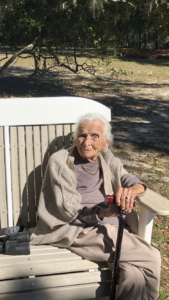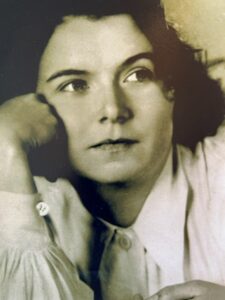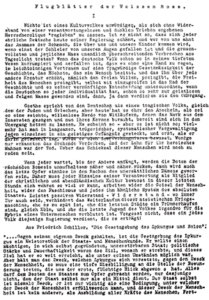Evanston RoundTable, April 25,2023
After the second world war, Traute Lafrenz Page didn’t talk much about her heroic resistance to the Nazi regime in her native Germany. Her four children didn’t even know about their mother’s courageous past until they were well into their teens.
Page, a 40-year resident of Evanston, passed away March 6 at the age of 103, the last member of the White Rose, a small group of idealistic Germans – mostly medical students – who circulated anonymous leaflets calling for the overthrow of Hitler and the Third Reich. On April 14, 1945, she was three days from trial and probable execution in Bayreuth, Germany, when American troops captured the city. Six of her fellow conspirators ¬had already been executed.

“I was a contemporary witness,” Page told the German newspaper Bild Zeitung in 2018. “Given the fates of the others, I am not allowed to complain.”
In his 2018 book Long Live Freedom: Traute Lafrenz Page and the White Rose, Peter Normann Waage wrote, “Resolutely declining honors and awards out of respect for those who did much more but were never named or discussed, [Page] has absolutely refused to be called a hero, preferring instead to call herself a witness to history, her testimony based on participatory observation.”
Page’s close friend, Maureen Tolman Flannery, held a similar view. “She talked little of imprisonment by her countrymen in the war years of die Weisse Rosa,” Flannery wrote in Grace, a poem based on a conversation the two had in 1990. “I suppose she didn’t want courageous acts of youthful abandon to herald her through life, or become, as for some, a badge to replace the honor of everyday life.”
Grace tells the story, as related by Page, of a prison incident in March 1945, passing notes at nighttime to fellow prisoners. They would attach the notes to belts and swing them through the bars of the windows to each other. But Page’s note got loose and fell to the courtyard below.
“There it stayed, my note, their evidence, soon to become my sentence, my execution,” Page related in the poem.
“I thought, how, in the morning, they
would find it there, and I would not live out the day.
I thought about home,
wondered what was happening in March
under the ground of my mother’s garden,
the garden I had known so well as a child,
but had ignored in recent years. I imagined
myself on a May morning in that garden,
yellow sunlight reflecting off white hyacinth.
I wondered what death would be like, really.
I even thought about the children
I would not have, wondered how many
children wanted to live in me, pictured
their hair, the color of their eyes,
the fleshiness of their ruddy cheeks.
But I thought most of that conspicuous
white paper, lying as I and waiting.
I must finally have slept.
In the morning I saw that
a heavy snow had fallen.
A clean white covered everything.”
Page was born in Hamburg on May 3, 1919, the youngest of three sisters. Her father, Karl Lafrenz, was a civil servant. Her mother, Hermine, worked as a secretary in a chocolate factory.
“Both of my parents had a tremendous interest in classical literature,” she recalled. “My father spent most of his free time translating classical texts from French, and later from Greek, and handwrote all of his translations in a beautiful cursive script.”

“Even though I was only about 14 when Hitler came to power, the other pupils and I were aware very early on of how oppressive the new regime was,” she recalled later.
In high school she was deeply influenced by Erna Stahl, a teacher imbued with the wisdom of great German and Russian literature and humanistic philosophy. “Erna Stahl hoped that her methods of teaching history would contribute something that could somehow restrain the Nazi insanity.” Page said later. “The goal of her pedagogy was to teach students to think and to become independent people.”
Another influence was the Austrian writer and social reformer Rudolf Steiner, whose educational philosophy led to the founding of Waldorf schools. Waldorf integrates “the arts in all academic disciplines for children from preschool through twelfth grade to enhance and enrich learning,” according to its website. “Waldorf education aims to inspire life-long learning in all students and to enable them to fully develop their unique capacities.”
Page attended medical school in Munich, where she met and joined the White Rose conspirators, who, starting in 1942, secretly distributed leaflets urging Germans to rise up against the Nazis.
The leaflets, wrote Waage in his 2018 book, consisted of “a raging indictment of the Nazi regime, but also of the lack of due diligence and the moral laziness among the populace that made Nazism possible. ‘Nothing is more shameful to a civilized nation than to allow itself to be ‘governed’ by an irresponsible clique of sovereigns who have given themselves over to dark urges – and that is without resisting,’ opens the first leaflet. ‘Isn’t it true that every honest German is ashamed of his government? Who among us can imagine the degree of shame that will come upon us and upon our children when the veil falls from our faces and the awful crimes that infinitely exceed any human measure are exposed to the light of day?’
It was clear in all the leaflets, Waage wrote, “that the authors believed that classical literature and philosophy could awaken feelings of guilt and self-awareness in the German nation and the German individual. The quotations they used to support these goals included quotations from the writings of Augustine, Goethe, Schiller, Novalis, the Bible, Aristotle, and Lao-tzu. It was as if they wanted to repeat the efforts that Erna Stahl had undertaken but for a wider, adult public.”
“We will not keep silent,” the fourth leaflet concluded. “We are your guilty conscience. The White Rose will not let you alone!”

“The days were empty, indistinguishable, and the nights were long,” Page said later. “I had no right to complain. It was unthinkable that any of us who were imprisoned would complain about anything when we consider the fate of the other six.”
Those six – Sophie and Hans Scholl, who were siblings; Christoph Probst; Alexander Schmorell; Willi Graf; and Kurt Huber – were Page’s friends and compatriots. They went to their deaths in 1943. “In all, 80 people connected with the organization were arrested and charged in court,” according to Waage.
Not all Germans ignored the White Rose call to arms. The famed author and Nobel laureate Thomas Mann, broadcasting in German from BBC studios in London in 1943, called the conspirators “Good, splendid young people,” and went on to say, “You shall not have died in vain! You shall not be forgotten. The Nazis have raised monuments to indecent rowdies and common killers in Germany – but the German revolution, the real revolution, will tear them down, and in their place, will memorialize those people, who, at the time in Germany and Europe were still enveloped in the dark of night, knew and publicly declared: ‘A new faith in freedom and honor is dawning’”
Looking back on it many years later, Page reflected that “this act of resistance was something that just had to be done. And it wasn’t especially brave, even if many think that now. People of our own age were dying all around us. It was dangerous just to be alive. Bombs were falling everywhere; nothing was safe. We had a completely different attitude toward death than people have during times of peace. Death was always just around the corner, no matter what one did.”
After the war Page finished medical school in Hamburg, after which, thanks to the sponsorship of a Jewish friend who had moved to America, she emigrated to California. There she met her future husband, Vernon Page, a fellow medical student. They were married in 1949 and opened a clinic in Hayfork, California, then in 1953 moved to Chicago where her husband joined a downtown medical practice.
From 1953 to 1993 the Page family lived in four Evanston residences: an apartment on Grove Street across from the McGaw YMCA, houses at 1207 Main St. and 1311 Livingston St., and a condo at 487 Sheridan Road.
There were four children: Renee, born in 1950; Michael, in 1951; Tom, in 1954; and Kim, in 1957. They all went through the Evanston school system and graduated from Evanston Township High School.
Asked what he felt when he learned about his mother’s exploits, Michael Page said, “I was impressed of course, and more so over the years. But as I learned to know my mother, I felt it was very consistent with her character.”
“She was courageous in every way,” Meyer said. “She was such a force.”
Meyer described her mother as “extremely dynamic, extroverted and funny,” someone who attracted many devoted friends. Family trips were important to her. She played the recorder, loved the opera and liked to cook, host frequent dinner parties, garden and hike mountain trails.
“She was very bright,” recalled her daughter-in-law, Sarah Page, an Evanston resident. “She expected you to catch on quickly. She was a wonderful mother-in-law, she was wonderful to our children. They loved her dearly.”
Meyer was in town recently to attend a memorial service for her mother. She related that after the war her mother worked for the Red Cross before coming to America and eventually settling in Evanston. Page continued to practice medicine in her home while, from 1971 to 1994, she was the director of Esperanza, a school just northwest of the Loop for children and young adults with autism and developmental disabilities.
Page also traveled the U.S. and Europe teaching science at Waldorf schools, and ran the Waldorf summer school at First Presbyterian Church in Evanston.
At the memorial service held April 15 in Chicago, many people related stories about Page’s sense of humor, dedication to justice and strong and lasting friendships. “My love for Traute runs deep,” one person wrote in a memorial book. “There are just no words for the gratitude that I feel for her presence in my life.”
Another wrote: “You were inspiring, practical, cosmopolitan, a modern-day urban woman…independent, warm, clear and very funny.”
“She didn’t belong to just us,” Meyer’s daughter said of her grandmother. “She belonged to a much bigger circle, not just White Rose.”
Kim Page, the youngest of the four children, said his mother never discussed her exploits when they were growing up. “Her life had changed so much, she had just moved on.”
Tom Page, who still lives in Evanston, said he only learned of his mother’s involvement in the Nazi resistance when he interviewed her for a school project his junior year at Evanston Township High School. “I wasn’t surprised, I could see her doing something like that,” he said, but added he was “flabbergasted” he hadn’t heard about it before.
He wondered if, as a young medical student, she really understood the risks she was taking. “It was a combination of bravery and naivete.”
In a sense, Page agreed. She wrote many years after the war, “[W]hen I read the leaflets now, I have to ask myself, for whom were they written and what were the writers thinking? People were in pieces. Everyone had lost fathers, brothers, sons, or lived in constant expectation that they or perhaps their nearest and dearest might die at any time. How could anyone believe that Germans would be able to gather enough spiritual power for composure and introspection – and revolution – during such extreme and terrible conditions?”
Perhaps that’s another reason she didn’t want to paint a heroic picture of her resistance work.
Meyer related that three years ago the German government approached her mother on the occasion of her 100th birthday to present her with an order of merit. The citation read that Page “belonged to the few who, in the face of the crimes of national socialism, had the courage to listen to the voice of her conscience and rebel against the dictatorship and the genocide of the Jews. She is a heroine of freedom and humanity.”
“Mama, they want to give you a medal,” Meyer told her mother, who was reading to her great-grandson at the time. Page’s reaction: a sardonic and dismissive wave. “It meant very little to her,” Meyer said with a laugh.




+ There are no comments
Add yours